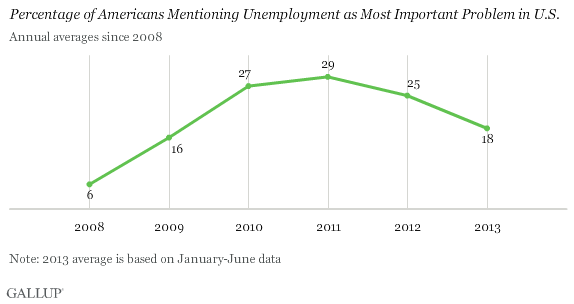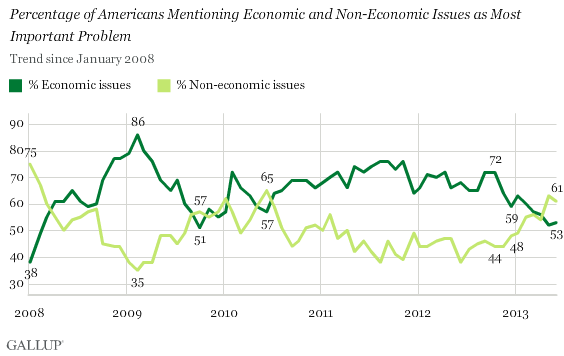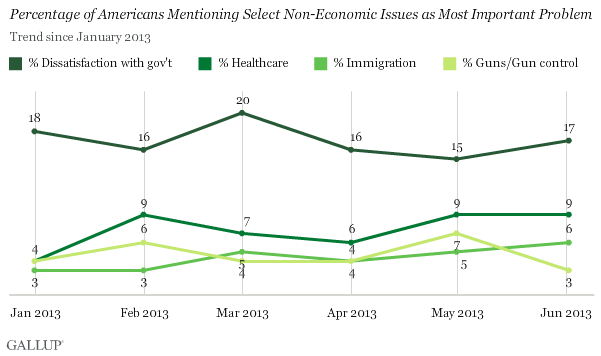PRINCETON, NJ -- Americans continue to name the economy as the biggest problem facing the country, followed by unemployment and dissatisfaction with government. These are trailed by concerns about healthcare, ethics and moral decline, the federal budget deficit, immigration, and education, each mentioned by at least 5% of Americans.
![Recent trend: What do you think is the most important problem facing this country today? [OPEN-ENDED]](http://content.gallup.com/origin/gallupinc/GallupSpaces/Production/Cms/POLL/uumrdfg4yewsee1jow30aw.png)
The new data on Americans' views of the top problems facing the country are from a June 1-4 Gallup survey.
The 18% of Americans who in June name unemployment as the nation's top problem is identical to the six-month average so far this year, which in turn is well below last year's 25% annual average, and is at this point the lowest annual average since 2009.

Additionally, although the economy and unemployment continue to rank as the nation's top two specific problems, the percentages of Americans mentioning any economic issue in in June (53%) -- and in May (52%) -- are the lowest since the fall of 2009. Mentions of the economy peaked at 86% in February 2009. Meanwhile, mentions of non-economic problems this month and last month have risen to as high as they have been since June 2010.

Dissatisfaction with the way government works is the most frequently mentioned non-economic issue once again in June, as it has been in recent prior months. Americans' mentions of guns and gun control fell to 3% in June, after spiking to 7% in May.
Immigration -- a controversial issue, which the U.S. Senate is devoting considerable time to this week -- is mentioned by 6% of Americans, less than the 9% who mention healthcare.

Americans' top-of-mind concern about North Korea as a leading problem essentially disappeared from the top problem list in June and in May, after flaring up in April -- reaching 4% -- as that country was threatening to attack South Korea and the United States.
Implications
Americans' longstanding concern with economic problems is easing, as the percentage mentioning economic issues remains on the low end of what Gallup has measured since the economic downturn. And in the two most recent months, the percentage mentioning any non-economic issue has exceeded the percentage mentioning an economic issue.
However, the top specific issues mentioned -- the economy in general and unemployment -- are still economic in nature, indicating that although concern about the economy is easing in many respects, it remains fairly prominent in Americans' minds. That is not uncommon for the "most important problem" trend historically, with the economy -- particularly if it is sluggish or there are areas of economic weakness -- usually near the top of the list.
Survey Methods
Results for this Gallup poll are based on telephone interviews conducted June 1-4, 2013, with a random sample of 1,529 adults, aged 18 and older, living in all 50 U.S. states and the District of Columbia.
For results based on the total sample of national adults, one can say with 95% confidence that the margin of sampling error is ±3 percentage points.
Interviews are conducted with respondents on landline telephones and cellular phones, with interviews conducted in Spanish for respondents who are primarily Spanish-speaking. Each sample of national adults includes a minimum quota of 50% cellphone respondents and 50% landline respondents, with additional minimum quotas by region. Landline telephone numbers are chosen at random among listed telephone numbers. Cellphone numbers are selected using random digit dial methods. Landline respondents are chosen at random within each household on the basis of which member had the most recent birthday.
Samples are weighted to correct for unequal selection probability, nonresponse, and double coverage of landline and cell users in the two sampling frames. They are also weighted to match the national demographics of gender, age, race, Hispanic ethnicity, education, region, population density, and phone status (cellphone only/landline only/both, cellphone mostly, and having an unlisted landline number). Demographic weighting targets are based on the March 2012 Current Population Survey figures for the aged 18 and older U.S. population. Phone status targets are based on the July-December 2011 National Health Interview Survey. Population density targets are based on the 2010 census. All reported margins of sampling error include the computed design effects for weighting.
In addition to sampling error, question wording and practical difficulties in conducting surveys can introduce error or bias into the findings of public opinion polls.
View methodology, full question results, and trend data.
For more details on Gallup's polling methodology, visit www.gallup.com.
